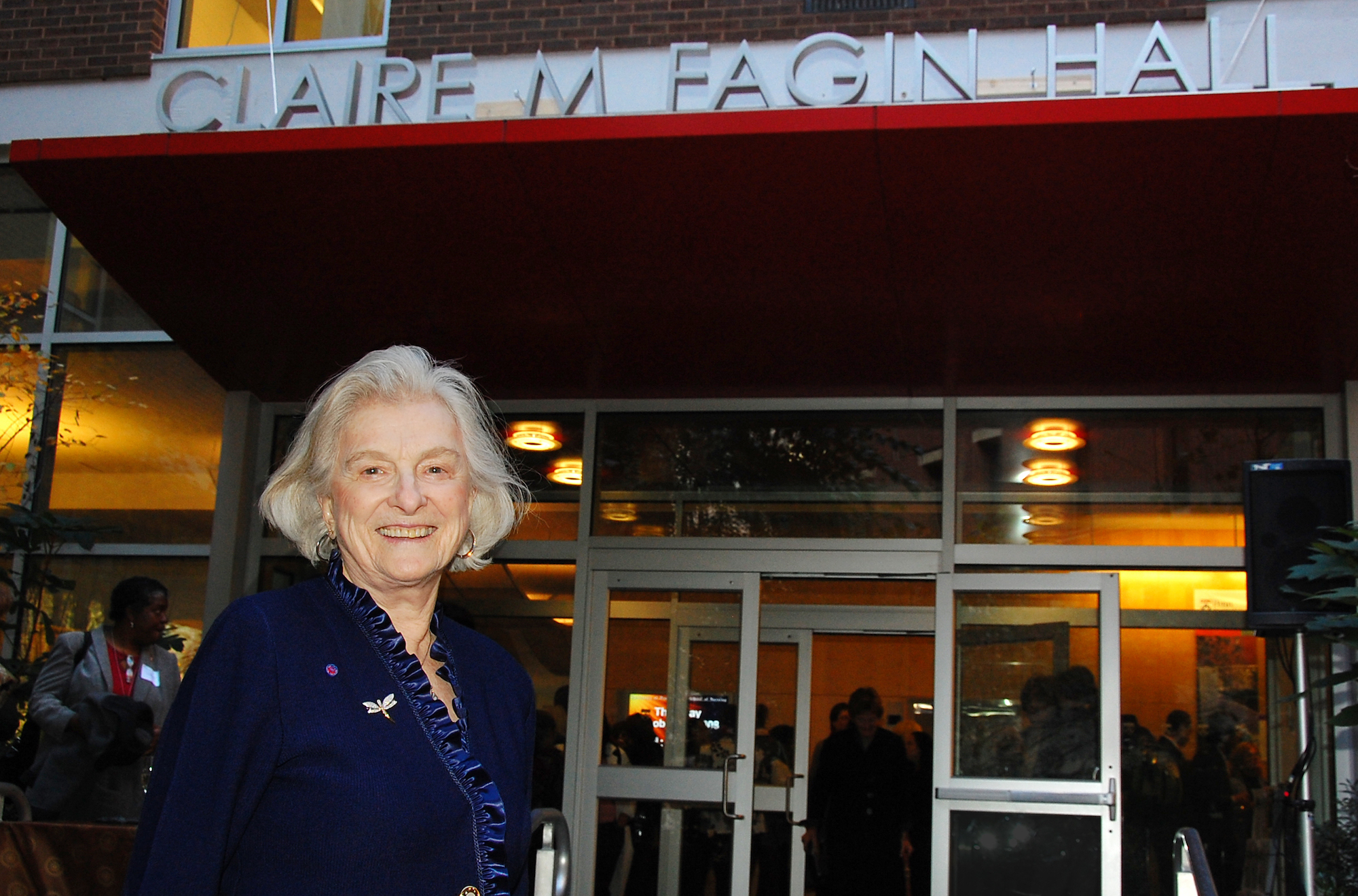
Claire Fagin, the former Penn Nursing School dean who served as interim president of Penn in 1993-94, died Jan. 16. A renowned nurse, researcher, and leader, she is remembered as a pathbreaker and “force of nature” who had a knack for connecting with people, making them laugh, and inspiring them to reach their highest potential.
“Dr. Fagin will be remembered for myriad accomplishments, including the distinction of being one of the first women to lead an Ivy League institution and being the first female leader of Penn,” says Interim Penn President J. Larry Jameson.
In that position, Fagin provided a vital link between the accomplishments of the Martin Meyerson and Sheldon Hackney administrations and the promise of the Judith Rodin administration that was to follow, Jameson says.
“Dr. Fagin led during a challenging time and very much served the role of healer, seeking broad community input, and implementing many of the recommendations that inform our policies of open expression, respect, and civil discourse today,” he says.
Strengthening the Penn community was Fagin’s priority as interim president. When she accepted the position, there was a great deal of contention and racial tension at Penn, and a loss of major donors. Fagin helped rebuild the Penn community by working with the University’s Commission on Strengthening the Community to engage faculty, staff, and students around free speech, race relations, and sexual harassment. She also traveled throughout the country to bolster the sense of Penn’s community.
“She not only paved the way for future women leaders of the Ivy League, but also laid the groundwork for the lineage of Penn presidents who followed,” says Ramanan Raghavendran, chair of the Board of Trustees.
After her time as interim president, Fagin returned to teaching and research among the Nursing faculty, where she served until her retirement in 1996. She continued to work as a consultant to several nursing schools and research projects.
Fagin was the Margaret Bond Simon Dean of the School of Nursing from 1977 until 1992, and during her tenure, brought nursing education to the forefront at Penn. She grew the standing faculty, created landmark education and research programs, launched a funded research center, and developed and implemented a Ph.D. program.
“Today, the Penn Nursing community and the wider nursing, University, and health care community remembers a transformational leader and celebrates her incredible life and accomplishments,” said Penn Nursing dean Antonia M. Villarruel. “Claire Fagin’s impact cannot be understated. She was a friend, mentor, teacher, and inspiration to me, our students, our faculty, and so many others. As we mourn her loss, we also remember her kindness, humor, and generosity. She touched generations of lives, and her impact and legacy lives on in each of us.”
Fagin’s pioneering research—beginning with her groundbreaking Ph.D. dissertation that showed hospitalized children had better outcomes if their parents “roomed in” with them—and personal accomplishments broke barriers while advancing nursing by setting high standards for nursing education, advocating for the role of nursing, and promoting and facilitating the careers of nurse leaders.
Marvin Lazerson, former dean of the Graduate School of Education, served as interim provost from 1993 to 1994, while Fagin was interim president. He was a member of the University’s Commission on Strengthening the Community and was widely respected for his leadership in resolving the problems that faced Penn at that time.
“Everybody understood that women presidents throughout the Ivy League were coming, but that Penn led the way was truly exciting, especially when Claire’s appointment was followed by Judith Rodin’s appointment,” says Lazerson.
Fagin was the right person at the right time to lead Penn, he says.
“Claire engaged with people. Much of her time was spent in campus residences, at gatherings of alumni, and speaking to the media to tell Penn’s story,” Lazerson says. “The timing was historic in the sense that campus unrest and complaints in leading media centered around racial issues, the limits of speech codes, and how to protect all of our students from discriminatory behaviors,” he says. “Claire was a master at getting people to come together, helped by her honesty, dignity, charm, humor, ethical values and willingness to confront issues in straight and forthright ways.”
Lazerson says Fagin inspired those around her to reach higher levels of achievement.
“She was one of a kind and a force of nature,” he says. “In my own case, she helped me live up to incredibly high standards as the interim provost, often kicking and pushing me. One of her best lines was after she and I had a sharp disagreement on something and she said, ‘Marvin, if I did not like working with you so much, I would fire you.’ I smiled for weeks after that.”
For her extraordinary accomplishments, Fagin was presented with many University, national, and international awards including the Alumni Award of Merit in 1991, and the Penn Club of New York named her the 2012 honoree for the Guggenheim Honor Cup. Her legacy at Penn lives on through the Claire M. Fagin Leadership Chair in Nursing, the Claire M. Fagin Distinguished Researcher Award, the Claire and Sam Fagin Scholarship, and the Nursing School’s Claire M. Fagin Hall, which were named in her honor.
A University celebration of Fagin’s life and achievements will be held on campus in the spring.







